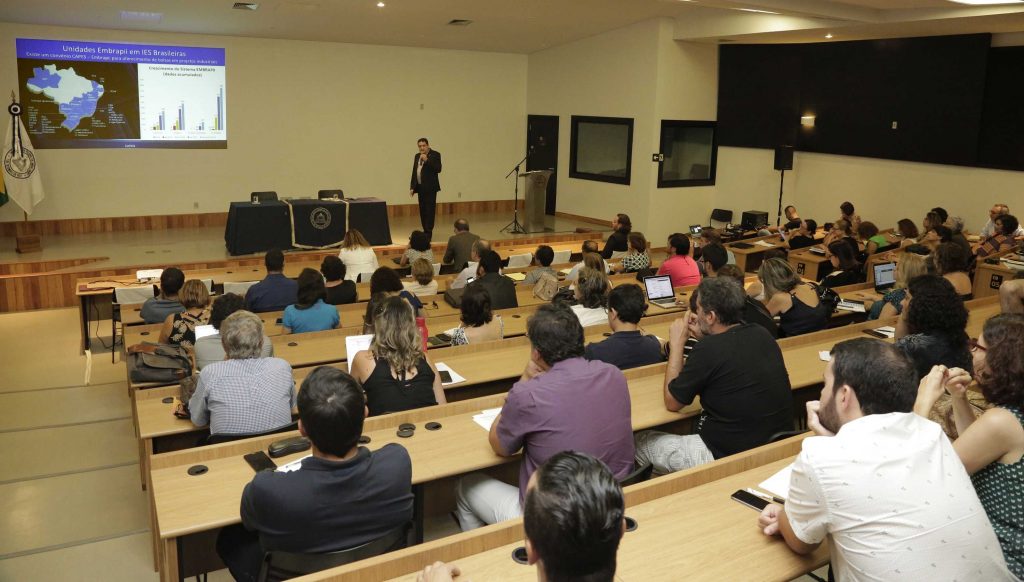
A CAPES representative showing the new evaluation model for graduate programs. Photo: Foca Lisboa | UFMG

A CAPES representative showing the new evaluation model for graduate programs. Photo: Foca Lisboa | UFMG
Building on undergraduate and postgraduate initiatives, UFMG has started to include international topics in all its graduate programs. The proposal is to expand such topics in foreign languages as an integral part of the curriculum in all domains, especially at the doctoral level.
Such a measure can also positively influence the undergraduate studies, since the university has Groups of Advanced Training Courses, which provide undergraduate students with contact with master's and doctoral courses early in their education.
Since the Science Without Borders Program, which accounted for a great outgoing mobility for both undergraduate and graduate students, the UFMG community has awaken to internationalization. Today, a simple walk through the university is an experience to hear people naturally talking in several languages, especially English. This new environment has been constantly encouraged, for instance through the UFMG Call 001/2018, which opened places for 51 visiting professors to work in undergraduate, graduate and/or extension and outreach programs.
The intention is to make this a steady movement at UFMG, especially by encouraging the temporary presence of researchers from various domains. All visiting professors are required to develop teaching activities at undergraduate and/or graduate levels, with a view to an increased growth of international topics in UFMG's classrooms.
UFMG has invested in expanding and improving the quality of its publicity materials for foreign stakeholders. PrInted and digital materials have been produced and continuously updated, including institutional videos and brochures and leaflets, in English and Spanish, for distribution to foreign visitors and in missions outside Brazil. UFMG website contains basic content in English to attract foreign visitors.
Extensive investment has been made in the graduate program websites to provide relevant information to potential and actual foreign visitors and student candidates. In 2016, the Dean's Office for Graduate Studies (PRPG) promoted, with the support of the UFMG Communication Center (Cedecom), the development of a common, customizable template for all graduate problems that included mirrors for translation in English and/or Spanish. Example are the websites of the Graduate Program in Law and the Graduate Program in Education. In fact, 78% of the graduate programs that provide doctoral degrees have websites in English and 70% also have versions in Spanish. The goal is to have trilingual websites for all such programs.
Top-rated universities have invested heavily in the qualification of human resources devoted to internationalization. Despite the intense staff performance at the Office for International Affairs and the Advisory Board for International Affairs at the Dean's Office for Graduate Studies, created around two years ago, UFMG is still to reinforce a training policy for its administrative staff working in the process of internationalization.
The UFMG Office for International Affairs is also expected to promote language courses and internationalization seminars and encourage the attendance of its staff in training events outside Brazil.
The domain of a foreign language is a current requirement for employees that engage in international encounters in the departments of UFMG's Central Administration. In recent years, UFMG has also invested in hiring bilingual executive secretaries for a number of sectors.
Agreements have been made for the Language Without Borders program, responsible for actions underlying the internationalization of the Brazilian higher education, to provide special classes that expand the proficiency of the graduate program secretaries. Further initiatives include administrative training, still implemented on a small scale by AUGM's program Escala Gestores y Administradores and by summer schools organized by partner institutions in the European Union.
In 2016, UFMG signed its first agreement of strategic partnership. The Key Technology Partnership Agreement (KTP) with the University of Technology Sydney was a milestone towards reciprocation by foreign institutions interested in partnerships with UFMG. In this agreement, the University of Technology Sydney recognizes UFMG as a strategic partner and provides financial support for projects developed collaboratively.
In 2017, the Macquarie University provided UFMG with funding for three doctoral theses developed in co-tutelage. In 2018, the University of Warwick provided UFMG with funding for three young PhDs, members of the permanent faculty, to spend short periods outside Brazil and develop joint research projects.
These three reports are just a few illustrative examples of the enormous potential for reciprocation to be offered by foreign partner institutions. The expertise and installed capacity at UFMG are recognized by several of these partner institutions, which spontaneously offer funding opportunities.
The Institutional Project for Internationalization will allow UFMG to negotiate such reciprocation from an academic and scientific perspective. This can occur in a natural and organized way as the joint actions between UFMG and its foreign strategic partners grow both in volume and in intensity.
UFMG has developed a strategy of intense internationalization that has grown rapidly over the past 20 years. This includes a Program of Support to International Cooperation Projects (PAPCI), from the UFMG Office for International Affairs, which encourages international cooperation and partnerships.
Aimed at faculty and staff with permanent ties with UFMG, the program aims to fund projects of international cooperation, including missions outside Brazil or receptions of foreign missions at UFMG.
Another program is the French-Brazilian Chairs at UFMG, which brings French scholars for seasons at UFMG with the support of the French Embassy. While the French Embassy is responsible for the flight costs, UFMG is responsible for funding visiting scholars' stay at the university. The good results of this initiative have guaranteed the continuity of the program, which is in its fifth edition in 2019.


